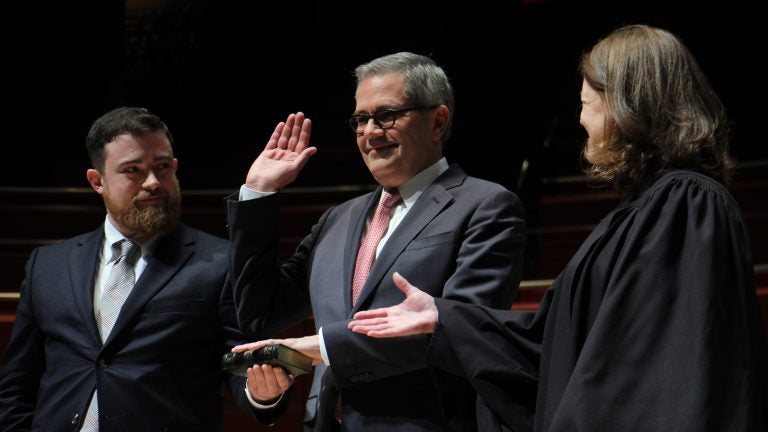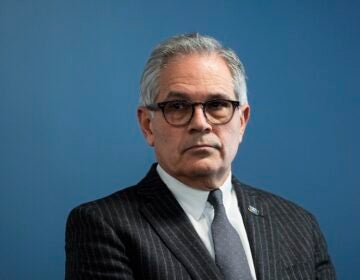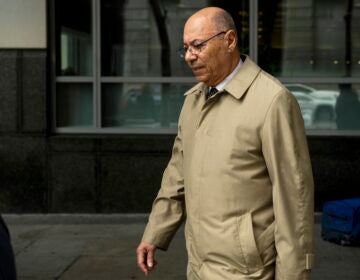Krasner takes oath as very different kind of DA for Philly
Veteran civil rights lawyer Larry Krasner is promising drug treatment over incarceration and second chances for nonviolent offenders, among other reforms.
Listen 2:04
Philadelphia District Attorney Larry Krasner is sworn in by his wife, Judge Lisa Millett Rau, with son Nathan holding Bible. (Emma Lee/WHYY)
Veteran civil rights lawyer Larry Krasner was sworn in as Philadelphia’s new district attorney on Tuesday, promising drug treatment over incarceration, resisting the federal government’s crackdown on unauthorized immigrants, and second chances for nonviolent offenders. As during his campaign, Krasner outlined goals that chafe against traditional law-and-order positions usually assumed by top prosecutors.
“A movement was sworn in today,” Krasner said at the Kimmel Center for the Performing Arts. “Today we start the long road toward trading jail and death row for schools. Today we start the long road toward empowering and protecting some of our most vulnerable witnesses and survivors, immigrants who lack legal status.”
His wife, Philadelphia Common Pleas Judge Lisa Rau, administered the oath of office.
Krasner, who has never been a prosecutor, will now lead an office with a staff of 600 and a nearly $40 million budget that prosecutes tens of thousands of crimes a year.
“Movements don’t have lawyers as leaders, but lawyers as technicians,” Krasner said. “To seek justice in society, to communicate the truth, to represent the public, to exercise power with restraint, with our roots dug deep in equality.”
Krasner, 56, who spent the last 30 years representing protesters and accused criminals, will now set charging priorities in one of the country’s busiest district attorney offices.
He will also preside over a law enforcement office in a city, as Krasner noted in his speech, with the highest level of incarceration among the country’s largest cities. It is a dubious distinction Krasner hopes to reverse.
“Where is that teacher who would cut the class size in half? The other teacher we need is lost in the cost of a jail cell occupied by a person who has no business in a jail cell,” he said.
Mayor Jim Kenney told the audience that Krasner’s background as a civil rights lawyer fighting on behalf of the accused and those alleging police abuse makes him “the right man for the job at the right time for the city of Philadelphia.”
In May, Krasner surged to victory amid a crowded field of six Democratic challengers by tapping into a broad base of support among young progressive who became energized by Krasner’s promises of lowering the jail population, scrapping cash bail, and backing away from tough sentences for low-level crimes. And in November, Krasner handily beat out Republican challenger and longtime prosecutor Beth Grossman.
On top of that, Krasner received an important financial boost from liberal hedge-fund manager George Soros, who has supported anti-death penalty, reform-minded district attorney candidates around the country. Soros spent $1.7 million on independent expenditures supporting Krasner’s candidacy.
One of Krasner’s most formidable challenges will be creating a workable collaboration among cops and prosecutors, some of whom view the new DA, who spent a career suing the two groups, as an adversary.
Philadelphia’s largest police union opposed Krasner. FOP President John McNesby called him a “left-wing, anti-law- enforcement radical.” A group of former assistant district attorneys also warned that Krasner as top prosecutor would be “dangerous” to the city and that he downplayed victim advocacy during his campaign.
But in the wake of the corruption conviction of the city’s last elected DA, Seth Williams, and after the Trump administration vowed to toughen sentences for drug offenders and launched initiatives to crack down on violent offenders, voters sought a different course in choosing Krasner.
Krasner has said he will not prosecute crimes with evidence seized through illegal stop-and-frisks. And he says he is committed to never seek the death penalty, in addition to weeding out police corruption. All of these policy shifts come at a time when the city’s appetite for major criminal justice reform appears strong.
“Larry Krasner is not a brother who stood silently by,” said the Rev. Isaac Miller, who formerly led the Church of the Advocate. “Larry knows he would not be here if he were by himself.”
WHYY is your source for fact-based, in-depth journalism and information. As a nonprofit organization, we rely on financial support from readers like you. Please give today.




